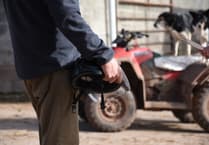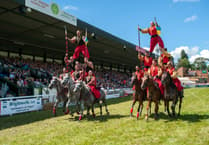It is a very busy period on our farms with both lambing and calving, now in full swing. We won’t discuss the weather, currently a very depressing subject matter!
With Easter holidays now over, we know that many families take this period as an opportunity to gather together and celebrate over an Easter lunch. A leg or shoulder of lamb is a firm favourite in many households and we hope that food shoppers the length and breadth of Wales remembered to check the label and purchased the best PGI status lamb in the world, Welsh lamb!
Local family run butcher shops will certainly have welcomed the meat sales boost with many supermarkets also placing Welsh Lamb firmly in the eye of their customers at the promotional fridges. We’ll have to wait for the Easter sale figures during the forthcoming weeks but let’s hope that there was a boost to sales.
Lamb fared well during the Valentine period, according to The Agriculture and Horticulture Development Board (AHDB). Whilst lamb is not classically associated with Valentine’s Day; this year saw the volumes bought increase by 5.7 per cent. For Welsh sheep farmers it is very encouraging to hear that lamb outperformed the total meat, fish, and poultry market for the period in question.
We understand that a key driver of lamb’s performance was the success of added value products, things like marinated lamb already pre-prepared in foil trays or sous vide products, which means vacuum-sealing food in a bag and cooking it in a precisely regulated water bath. Our butchers are doing a great job of providing these types of lamb products from their counters too, easy to cook after a busy day at work, and having the key advantage of being tasty and nutritious.
There was a slight increase in the volumes of stewing, leg roasting joints and mince purchased in the 2-week period of the lovers’ special day, but the added value products accounted for the majority of lamb sales growth this Valentine’s Day.
Hybu Cig Cymru has also offered some insight into great lamb prices at livestock markets in recent weeks. Peak consumption of lamb is usually seen during religious festivals and this year both Easter and Ramadan, the Islamic festival, occurred in March, driving up demand for both chicken and lamb.
This abnormal amount of wet weather is causing great difficulty for farmers across Wales, whether they are in the full swing of lambing or having to keep their dairy and beef herds indoors for a prolonged period of time. With such an extremely wet start to the year, we will likely see knock-on impacts in terms of poor germination of crops and grasses and delayed silage cutting dates. The extent of these impacts will become clearer later in the year when stocks of animal feed run low and prices increase.
Let’s hope the weather improves for a spring across Wales that allows us to take advantage of these ‘lighter’ days.





Comments
This article has no comments yet. Be the first to leave a comment.